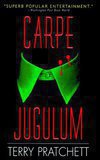
“Carpe Jugulum," read Agnes aloud. “That’s… well, Carpe Diem is ‘Sieze the Day,’ so this means-”
“Go for the throat”
Close enough.
Short version: Vampires have come to visit and they’ve decided to stick around for a while. What’s more, they seem to have overcome most of those troublesome weaknesses that vampires usually have. It’s up to a the witches to save the day!
The witches are back for their final outing. Since Granny’s off in a cave somewhere, Agnes and Nanny Ogg go fetch Magrat. Tradition is tradition and Magrat is carrying around a little one, which means she must be the Mother. If Agnes is the Maiden–that must mean that Nanny Ogg has been relegated to the … Other One. A fact she is amusingly thrilled with.
There is a entire plotline about Agnes having essentially created a second personality in Perdita X that actually helps her resist the vampires. It’s interesting but also a little weird.
I like the vampires. In normal Pratchett style, they’re a nice combination of what you’d expect and a few new twists. The pixies/gnomes are strange. In the audio version, it’s basically impossible to tell what they’re saying–although that might be the point–so I just sort of tuned them out. I do hope/expect that some more of the denizens of Uberwald come back in some of the other storylines.
The priest of Om–and really the whole religion–is interesting. Imagine a church where schisms happen near weekly so that it’s near impossible to know what’s doctrine and what’s blasphemy anymore.
A solid story. Not quite up to the level of Maskerade, but still well worth the read.
Quote for thought:
“There are so mane shades of gray.”
“Nope.”
“Pardon?”
“There’s no greys, only white that’s got grubby. I’m surprised you don’t know that. And sin, young man, is when you treat people as things. Including yourself. That’s what sin is.”
“It’s a lot more complicated than that-”
“No. It ain’t. When people say things are a lot more complicated than that, they means they’re getting worried that they won’t like the truth. People as things, that’s where it starts.”
“Oh, I’m sure there are worse crimes-”
“But they starts with thinking about people as things…”